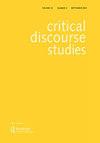Between autonomy and representation: toward a post-foundational discourse analytic framework for the study of horizontality and verticality
IF 2.1
2区 文学
Q2 COMMUNICATION
引用次数: 3
Abstract
ABSTRACT This paper sets out to think the relationship between horizontality and verticality from the perspective of post-foundational discourse theory, taking as a starting point the diachronic development from Laclau’s and Mouffe’s joint work on radical democracy to Laclau’s theory of populism. The argument here is that the shift in conceptual terrain from the autonomy of ‘democratic struggles’ to the representative function of ‘empty’ popular signifiers points to deeper shifts and slippages – especially around the category of antagonism – as well as a more general tension between a horizontal politics of autonomy and a vertical politics of representation, for which radical democracy and populism respectively take on a paradigmatic character. While horizontality is predicated on the autonomous multiplicity and ‘multiplication of antagonisms’, verticality entails the simplification and concentration of antagonism around central representative signifiers. The question thus becomes how antagonism is organized, or – drawing on Nonhoff’s concept of contrariety – to what extent the contrarieties defining the constituent parts of an equivalential chain are more multiple or more concentrated. This is followed by empirical considerations on how horizontality and verticality are organizationally mediated within current political projects, including a distinction between movement parties and Volksparteien neuen Typs (‘people’s parties of a new type’).在自主性和代表性之间:走向一个研究水平性和垂直性的后基础性话语分析框架
摘要本文试图从后基础话语理论的角度来思考横向与纵向的关系,并以拉克劳与莫夫的激进民主合作到拉克劳的民粹主义理论的历时发展为切入点。这里的论点是,从“民主斗争”的自主性到“空的”流行能指的代表性功能的概念领域的转变,指向了更深层次的转变和失误——尤其是在对立范畴周围——以及横向自治政治和纵向代表政治之间更普遍的紧张关系,激进民主和民粹主义分别具有典型特征。虽然水平性是基于自主的多重性和“对立的倍增”,但垂直性意味着围绕中心代表能指的对立的简化和集中。因此,问题变成了对抗是如何组织的,或者——借鉴农霍夫的反向性概念——定义等价链组成部分的反向性在多大程度上更多重或更集中。随后是对当前政治项目中如何在组织上调节水平性和垂直性的经验考虑,包括运动党和新人民党(“新型人民党”)之间的区别。
本文章由计算机程序翻译,如有差异,请以英文原文为准。
求助全文
约1分钟内获得全文
求助全文

 求助内容:
求助内容: 应助结果提醒方式:
应助结果提醒方式:


